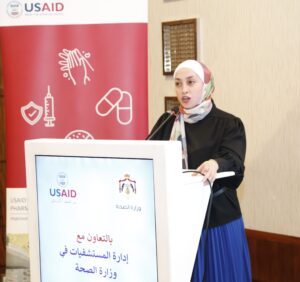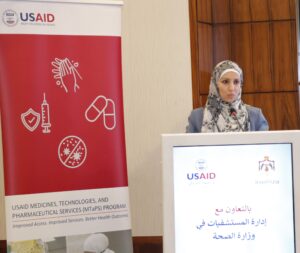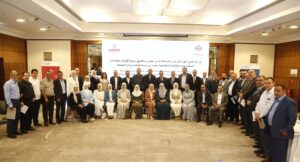Expanding Implementation of Protocols for Antibiotic Prophylaxis and Treatment in Jordan’s Hospitals
Since July 2022, USAID MTaPS has partnered with the Jordanian Ministry of Health (MOH) to implement interventions aimed at combating antimicrobial resistance (AMR), in alignment with the National Action Plan on AMR 2018-2022 (later updated for 2023–2025). MTaPS worked closely with the MOH to implement the plan’s objectives, particularly Objective 4, which focuses on optimizing antimicrobial use and promoting stewardship programs. MTaPS and the MOH developed customized rational use of antimicrobials (RUA) protocols and established hospital-based, multidisciplinary antimicrobial stewardship (AMS) committees to oversee the implementation and monitoring of these protocols. The effective application of these protocols will help ensure the sustainability and consistency of clinical practices, which is crucial for maintaining high standards of care, enhancing patient outcomes, and reducing AMR in Jordan.
In 2023, MTaPS worked with key MOH directorates and hospital AMS committees to develop protocols for surgical prophylaxis and urinary tract infection treatments and pilot them at Al Salt and Al Mafraq hospitals. As part of institutionalizing these protocols, MTaPS supported two directorates at the MOH, the Pharmacy and Clinical Pharmacy Directorate (PCPD), and the Institutional Development and Quality Control Directorate (IDQCD) in establishing performance indicators, integrating them into the MOH’s Performance Management Information System, and disseminating adherence policies at service delivery points. Additionally, MTaPS trained staff at the two pilot hospitals on the protocols’ implementation and adherence monitoring.
Lessons Learned Workshop from Pilot Implementation
To facilitate the adoption of protocols in 28 additional MOH hospitals and ensure rational and consistent use of antibiotics countrywide, MTaPS worked in collaboration with the MOH, the PCPD, the IDQCD, and the hospital administration, to organize a workshop sharing insights from the pilot phase and encouraging hospital directors to advocate for widespread implementation.


Dr. Rawan AlQurashi, Project Specialist at the USAID Population and Family Health (PFH), and Dr. Unaisa Alnuaimat, PCPD Director, provide welcoming remarks during the workshop. Amman. August 28, 2023. Photo credit: MTaPS Jordan
Key Lessons Learned
During the workshop, representatives from the pilot hospitals shared their experiences implementing the protocols and highlighted key lessons learned:
- Effective implementation of AMS is achieved through the activation of AMS committees, which ensures coordinated efforts for protocol adherence, facilitates timely oversight, and drives the success of AMS practices. This, in turn, optimizes antimicrobial use, reduces resistance, and enhances the overall impact of AMR efforts, leading to improved patient outcomes and long-term sustainability in healthcare practices.
- Tailoring AMS interventions to each hospital’s unique needs, in collaboration with MOH directorates, ensures effective implementation and overcomes local challenges. This personalized approach maximizes the protocols’ relevance and effectiveness, leading to higher adherence, more efficient antimicrobial use, and ultimately, a reduction in AMR.
- Ongoing education and training of healthcare providers are vital for maintaining high care standards and improving protocol adherence.
- A collaborative approach with IDQCD to develop the “Policy for Implementing the Rational Use of Antibiotics Protocols” greatly enhanced protocol implementation and adherence monitoring. This policy helped support AMS committees at both pilot hospitals to ensure consistent compliance with the protocols among healthcare providers.
- Continuous monitoring and evaluation by the AMS committees at both pilot hospitals, combined with a continuous quality improvement (CQI) approach, are essential for data-driven decision-making. Regular assessments of protocol adherence using CQI helped identify areas for improvement, track progress, and make timely adjustments, ensuring protocols remain effective and aligned with best practices.
- Effective dissemination of protocols to all departments at both pilot hospitals (through internal communication efforts, orientation presentations, distribution of written guidelines, training sessions with newly hired doctors, and regular follow-up meetings) emphasized a collaborative approach and contributed to the protocols’ implementation success.
- Visualizing protocols through posters placed in key areas of the hospitals contributed to improved adherence and promoted compliance with the protocols’ best practices.
Highlights from Panel Discussion
Led by representatives of the MOH, PCPD, IDQCD, and the directors of the two pilot hospitals, the workshop also included a panel discussion to inspire hospital directors to adopt the protocols based on the findings from implementation in the pilot sites. The panel facilitated knowledge and experience exchange between directors of the pilot and other MOH hospitals. The discussions highlighted the following points:
- Initiating the implementation of the protocols and activating the existing hospitals’ AMS committees to ensure coordinated efforts, facilitate timely oversight, and drive the success of AMS practices.
- Overcoming potential resistance from healthcare providers to implement the protocols, particularly doctors, to ensure their successful adoption and consistent implementation, thereby enhancing their effectiveness in AMS.
- Conducting training sessions on the protocols for newly hired healthcare professionals ensured consistent understanding and proper application.
- Collaboration with the quality unit and clinical pharmacists at the hospitals was essential to effectively collect and analyze protocols’ adherence data.
- Regularly reporting key indicators to the MOH IDQCD to track progress and impact of the protocols’ implementation.
- Applying ongoing quality improvement practices to refine and enhance implementation of the protocols.
- Addressing challenges such as staff shortages and limited capacity for monitoring the implementation of the protocols.

Workshop panel discussion including, from the left, Dr. Ayat Banat pharmacist at the MOH PCPD, Dr. Awad Al-Khazaleh Al Mafraq Hospital Director, Dr. Rami Abu Ruman Al Salt Hospital Director, and Dr. Amal AL Shafiee Pharmacist at the MOH IDQCD. Amman. August 28, 2023. Photo credit: MTaPS Jordan
Quotes
“I want to express my gratitude to the panel for their valuable insights, and to the MOH and MTaPS program for supporting such workshops. Observing the successful implementation of protocols at other hospitals and learning from their experiences is very encouraging. I am enthusiastic about moving forward with the implementation of these protocols at Al Ramtha Hospital.” Dr. Abd Al-Aziz, Al Ramtha Hospital.
“Thank you to the panel for the productive discussions. We greatly appreciate the insights and practical advice shared during the workshop. Our team is eager to attend the upcoming orientation session organized by the MTaPS program and the MOH. We believe that these protocols will enhance our antibiotic stewardship practices and improve patient outcomes at our facility.” Dr. Ayman, Al Badyah Hospital.
National Rollout
Following the successful pilot implementation, the MOH, in partnership with MTaPS, rolled out the clinical protocols to the remaining MOH hospitals in October 2024. The rollout included a series of orientation workshops held from October 28 to 31, 2024, targeting AMS committee members at hospitals not involved in the pilot. The workshops focused on protocol implementation and adherence and emphasized the roles and responsibilities of AMS committees in overseeing protocol adherence and implementation. 118 AMS committee members (54 females), including physicians, nurses, pharmacists, infection prevention officers, and quality officers, participated. Moving forward, the MOH PCPD and the IDQCD will oversee the ongoing implementation and adherence of these protocols, as the hospitals are now required to submit protocol adherence data to the MOH Performance Management Information System.
Additionally, MTaPS distributed display posters on surgical prophylaxis protocols to all hospitals to reinforce adherence among healthcare providers. These posters were strategically placed in key areas of selected MOH hospitals that perform surgeries, such as pre-and post-operative units, surgery wards, nursing stations, clinicians’ meeting rooms, and pharmacies. These locations were carefully chosen to ensure the posters were highly visible and easily accessible to medical personnel.

Attendees of the workshop from the MOH PCPD, IDQCD, MOH hospitals, MTaPS, and USAID PFH office, Amman. August 28, 2023. Photo credit: MTaPS Jordan